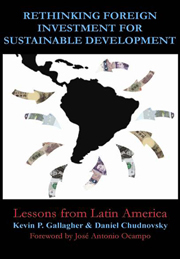Book contents
- Frontmatter
- Contents
- List of Figures
- List of Tables
- Foreword
- Acknowledgements
- Author Biographies
- Rethinking Foreign Investment for Sustainable Development
- 1 FDI and Sustainable Development in the Americas
- 2 Is Foreign Investment Always Good for Development?
- Part 1 Country Assessments
- Part 2 Political Economy of Natural Resources and The Environment
- Notes
- References
- Index
Foreword
Published online by Cambridge University Press: 05 March 2012
- Frontmatter
- Contents
- List of Figures
- List of Tables
- Foreword
- Acknowledgements
- Author Biographies
- Rethinking Foreign Investment for Sustainable Development
- 1 FDI and Sustainable Development in the Americas
- 2 Is Foreign Investment Always Good for Development?
- Part 1 Country Assessments
- Part 2 Political Economy of Natural Resources and The Environment
- Notes
- References
- Index
Summary
This volume is a major contribution to a growing body of literature that questions the assumptions of market reforms undertaken in Latin America in recent decades, on the basis that market reforms did not deliver on their basic promise: rapid economic growth. Indeed, even when we take into account the recent period of exceptional conditions in international commodity and capital markets that has facilitated rapid growth in Latin America since 2004, the rate of GDP growth in the region has been 3.3 percent from 1990 to 2007 (and only 2.5 percent if the point of reference is 1980), far short of that achieved during the phase of import-substitution industrialization—or, as I prefer to call it, state-led industrialization—when Latin America grew at an average rate of 5.5 percent a year. Another set of criticisms relates, of course, to the disappointing social effects of market reforms. Again, a simple reflection of this fact is that only in 2005 did Latin America return to the poverty levels of 1980—i.e., the region experienced not a decade, but a quarter century lost in terms of poverty reduction.
The volume concentrates on one of the major aspects of the globalization and liberalization processes: the growing role played by multinational corporations (MNCs) and the opening up of the Latin American economies to foreign direct investment (FDI). Drawing on case studies from about half of the countries in the region, it explores the determinants of FDI, the role that it has played in advancing environmental sustainability, and some political economy issues associated with such investments.
- Type
- Chapter
- Information
- Rethinking Foreign Investment for Sustainable DevelopmentLessons from Latin America, pp. xiii - xxPublisher: Anthem PressPrint publication year: 2009
- 1
- Cited by



